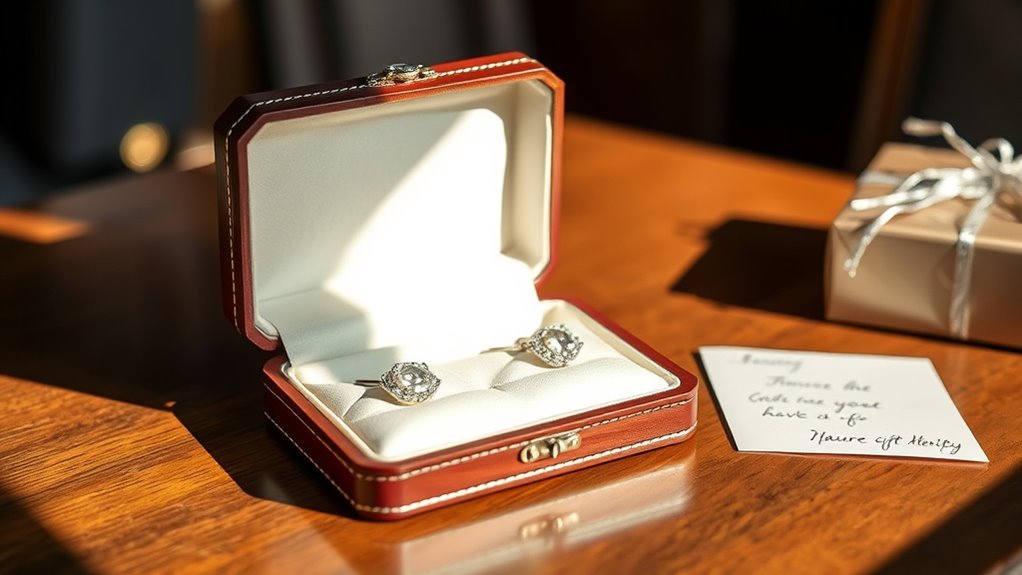Gift insurance makes sense when you’re giving valuable, sentimental, or high-risk items like jewelry, collectibles, or electronics. It protects against theft, damage, or loss, giving you peace of mind. If your gift exceeds standard coverage limits or is prone to risks, insuring it is a smart move. Knowing when and why to protect your special gifts can save you hassles later—exploring these details further shows you how to choose the right coverage.
Key Takeaways
- Gift insurance is advisable for high-value, rare, or sentimental items prone to theft, loss, or damage.
- It makes sense when the gift exceeds standard coverage limits or is in a risky environment.
- Insuring gifts provides peace of mind and financial protection against unexpected incidents.
- When gifting items with significant emotional or monetary value, insurance helps safeguard your investment.
- It is particularly beneficial for gifts that are difficult or costly to replace if damaged or lost.
Understanding the Scope of Gift Insurance

Have you ever wondered what gift insurance covers? It primarily protects against loss, theft, or damage to a gifted item. When considering coverage, understanding gift valuation is essential; it determines how much you’ll receive if something happens. Keep in mind, policy exclusions are common and can limit coverage. For example, some policies exclude certain types of damage or specific high-value items. It’s important to read the fine print to know what’s included and what’s not. Gift insurance isn’t a catch-all; it’s tailored to specific risks and items. Knowing the scope helps you decide if this coverage makes sense for your gift. By understanding gift valuation and policy exclusions, you can better protect your investment and avoid surprises when filing a claim. Additionally, understanding risk management strategies can help you make more informed decisions about insuring your gifts. Incorporating proper documentation can also streamline the claims process if needed.
Common Situations That Warrant Coverage

Certain situations clearly call for gift insurance to provide peace of mind. If you’re giving away rare collectibles or sentimental items, coverage can safeguard against loss, theft, or damage. Imagine gifting a valuable vintage watch or a family heirloom—these items hold significant emotional or monetary value. You should consider insurance if:
- The gift is a one-of-a-kind rare collectible with high worth
- Sentimental items with irreplaceable memories are involved
- The recipient lives in an area prone to natural disasters or theft
- The gift’s value exceeds what typical coverage plans cover
- When managing personal finance strategies, it’s wise to consider additional protection measures for valuable gifts. Understanding the benefits of specialized coverage can further inform your decision. Incorporating proper storage solutions can also help reduce the risk of damage or loss during transit or storage. Additionally, being aware of local insurance options can help you choose the most suitable policy for your needs.
In these cases, gift insurance ensures you’re protected from unexpected setbacks, preserving both your investment and the emotional significance of the gift.
Types of Gifts That Benefit From Insuring

Are some gifts more deserving of insurance coverage than others? Absolutely. Gift cards, for example, can lose value if they’re lost, stolen, or damaged, making insurance a smart choice. Similarly, collectible items like rare coins, artwork, or limited-edition memorabilia hold significant value and are vulnerable to theft or damage. Insuring these types of gifts helps protect your investment and ensures the recipient can enjoy their value later. High-value electronics, jewelry, and luxury watches also benefit from coverage, especially if they’re unique or irreplaceable. In general, gifts that are expensive, rare, or prone to loss and damage are prime candidates for insurance. Covering these gifts gives you peace of mind, knowing they’re protected against unforeseen circumstances. Additionally, electric bikes and dirt bikes are increasingly popular gifts that often come with a high price tag and specific maintenance needs, making insurance a prudent consideration for owners. Recognizing investment protection strategies can further safeguard valuable gifts from unforeseen risks. Furthermore, staying informed about personal debt forgiveness bills can help you manage your financial resources more effectively, especially when insuring high-value items. Beyond individual items, understanding comprehensive coverage options can help you tailor protection plans to fit different gift types and scenarios.
How to Choose the Right Gift Insurance Policy

Choosing the right gift insurance policy requires careful consideration of what you want to protect and your specific needs. You should evaluate factors such as coverage limits, duration, and costs. You should also consider how perfect fit living aligns with your expectations for quality and reliability. Be mindful of privacy concerns, especially how your personal information is handled and shared. Legal considerations are also vital—ensure the policy complies with local laws and clearly outlines your rights. To help decide, consider these aspects:
- Does the policy protect against theft, damage, or loss?
- Are there any restrictions on the types of gifts covered?
- How transparent are the privacy policies and data protections?
- What are the legal obligations if a claim arises?
- Understanding the role of software quality assurance can help in assessing the reliability and thoroughness of the provider’s claims and processes.
- Additionally, reviewing the provider’s reputation and customer reviews can offer insights into their service quality and support responsiveness.
Being aware of special event themes can also help in choosing providers that customize policies for specific occasions or unique gift scenarios.
Tips for Ensuring Your Gift Is Protected

To guarantee your gift remains protected, start by thoroughly understanding the coverage provided by your insurance policy. Confirm it offers personalized coverage tailored to the item’s value and nature. Additionally, consider liability considerations—know if you’re protected against damages or accidents related to the gift. Use this table to clarify your coverage options:
| Aspect | Details |
|---|---|
| Personalized Coverage | Adjust coverage to suit the gift’s uniqueness |
| Liability Considerations | Understand protection against damages or claims |
| Policy Limits | Know the maximum payout for your gift |
| Exclusions | Recognize what isn’t covered |
| Additional Riders | Add extra protection if needed |
Being aware of necessary cookies and other cookie categories can also help ensure your online information remains secure while managing insurance details online. It’s also wise to review the coverage duration to ensure your gift is protected for the appropriate period. Ensuring you understand the claim process can facilitate smoother claims if issues arise. Remember that staying informed about policy terms can prevent surprises if a claim needs to be made. Additionally, understanding credit card terms can be beneficial if you’re using credit for gift purchases, ensuring you are aware of interest rates, fees, and repayment conditions.
Frequently Asked Questions
Does Gift Insurance Cover Sentimental or Personalized Items?
Gift insurance typically doesn’t cover sentimental value or personalized gifts, since these items hold emotional significance beyond monetary worth. If you’re worried about loss or damage, it’s best to check your policy details or consider additional coverage options. Keep in mind that insurance mainly protects physical damage or theft, not the sentimental or personalized aspects that make your gifts special and meaningful.
Can Gift Insurance Be Transferred to the Recipient?
You might wonder if gift insurance can be transferred to the recipient. Typically, this involves a gift transfer or policy assignment, where you officially transfer ownership of the coverage. Not all policies allow this, so check with the insurer. If permitted, the process usually requires paperwork to assign the policy to the recipient, ensuring they’re covered directly. Always confirm the insurer’s rules before attempting a transfer.
What Is the Typical Cost of Gift Insurance Policies?
The typical cost of gift insurance policies varies based on coverage limits and policy exclusions. You might pay a small percentage of the item’s value, often around 1-3%, but this can differ. Keep in mind that some policies have exclusions that limit coverage for certain risks, so it’s important to review these carefully. Overall, the premium depends on the item’s worth and the specific protection you choose.
Are There Age Restrictions for Insuring Certain Gifts?
You might wonder about age restrictions for insuring gifts. Typically, insurance eligibility depends on the recipient’s age, with some policies having minimum or maximum age limits. For example, insuring a child’s gift may require the child to meet certain age criteria. Always check the specific policy’s age restrictions, as these vary by insurer. Understanding these age restrictions helps you determine if the gift qualifies for coverage and guarantees proper protection.
How Does Gift Insurance Handle International or Overseas Deliveries?
International deliveries can feel like steering a maze of customs regulations, but gift insurance simplifies this chaos. It covers lost or damaged items during overseas shipping and offers peace of mind. With delivery tracking, you can monitor your gift’s journey every step of the way, ensuring it arrives safely. This protection is especially valuable when sending precious or expensive gifts across borders, making overseas gifting worry-free and seamless.
Conclusion
Ultimately, considering gift insurance can be a smart move, especially if you believe in the theory that the value of a gift extends beyond money—embodying sentiment and memory. By insuring your gifts, you’re not just protecting your wallet, but also preserving the emotional significance behind your generosity. It’s a practical way to safeguard your intentions, confirming that even in unforeseen circumstances, your thoughtful gestures remain cherished and secure.









